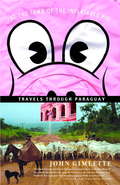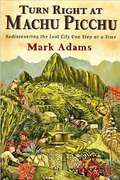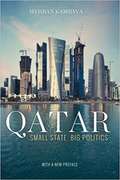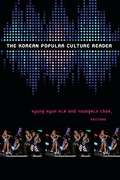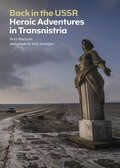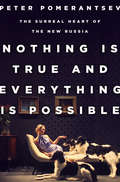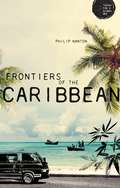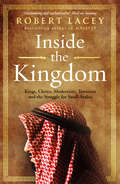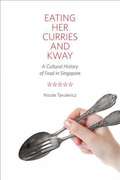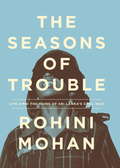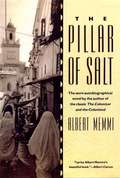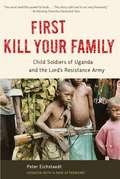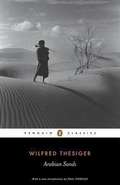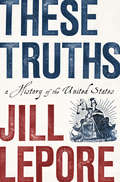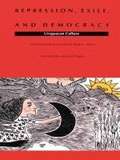Special Collections
World Book Day 2020: Marrakesh Treaty
- Table View
- List View
At the Tomb of the Inflatable Pig
by John GimletteA wildly humorous account of the author's travels across Paraguay-South America's darkly fabled, little-known "island surrounded by land."
Rarely visited by tourists and barely touched by global village sprawl, Paraguay remains a mystery to outsiders. Think of this small nation and your mind is likely to jump to Nazis, dictators, and soccer. Now, John Gimlette's eye-opening book-equal parts travelogue, history, and unorthodox travel guide-breaches the boundaries of this isolated land," and illuminates a little-understood place and its people.
It is a wonderfully animated telling of Paraguay's story: of cannibals, Jesuits, and sixteenth-century Anabaptists; of Victorian Australian socialists and talented smugglers; of dictators and their mad mistresses; bloody wars and Utopian settlements; and of lives transplanted from Japan, Britain, Poland, Russia, Germany, Ireland, Korea, and the United States.
The author travels from the insular cities and towns of the east, along ghostly trails through the countryside, to reach the Gran Chaco of the west: the "green hell" covering almost two-thirds of the country, where 4 percent of the population coexists-more or very-much-less peacefully-with a vast array of exotic wildlife that includes jaguars, prehistoric lungfish, and their more recently evolved distant cousins, the great fighting river fish. Gimlette visits with Mennonites and the indigenas, arms dealers and real-estate tycoons, shopkeepers, government bureaucrats and, of course, Nazis.
Filled with bizarre incident, fascinating anecdote, and richly evocative detail, At the Tomb of the Inflatable Pig is a brilliant description of a country of eccentricity and contradiction, of beguilingly individualistic men and women, and of unexpected and extraordinary beauty. It is a vivid, often riotous, always fascinating, journey.
Turn Right at Machu Picchu
by Mark AdamsWhat happens when an adventure travel expert-who's never actually done anything adventurous-tries to re-create the original expedition to Machu Picchu?
July 24, 1911, was a day for the history books. For on that rainy morning, the young Yale professor Hiram Bingham III climbed into the Andes Mountains of Peru and encountered an ancient city in the clouds: the now famous citadel of Machu Picchu.
Nearly a century later, news reports have recast the hero explorer as a villain who smuggled out priceless artifacts and stole credit for finding one of the world's greatest archaeological sites.
Mark Adams has spent his career editing adventure and travel magazines, so his plan to investigate the allegations against Bingham by retracing the explorer's perilous path to Machu Picchu isn't completely far- fetched, even if it does require him to sleep in a tent for the first time.
With a crusty, antisocial Australian survivalist and several Quechua-speaking, coca-chewing mule tenders as his guides, Adams takes readers through some of the most gorgeous and historic landscapes in Peru, from the ancient Inca capital of Cusco to the enigmatic ruins of Vitcos and Vilcabamba.
Along the way he finds a still-undiscovered country populated with brilliant and eccentric characters, as well as an answer to the question that has nagged scientists since Hiram Bingham's time: Just what was Machu Picchu?
Qatar
by Mehran KamravaThe Persian Gulf state of Qatar has fewer than 2 million inhabitants, virtually no potable water, and has been an independent nation only since 1971.
Yet its enormous oil and gas wealth has permitted the ruling al Thani family to exert a disproportionately large influence on regional and even international politics.
Qatar is, as Mehran Kamrava explains in this knowledgeable and incisive account of the emirate, a "tiny giant": although severely lacking in most measures of state power, it is highly influential in diplomatic, cultural, and economic spheres. Kamrava presents Qatar as an experimental country, building a new society while exerting what he calls "subtle power." It is both the headquarters of the global media network Al Jazeera and the site of the U.S. Central Command's Forward Headquarters and the Combined Air Operations Center. Qatar has been a major player during the European financial crisis, it has become a showplace for renowned architects, several U.S. universities have established campuses there, and it will host the FIFA World Cup in 2022. Qatar's effective use of its subtle power, Kamrava argues, challenges how we understand the role of small states in the global system. Given the Gulf state's outsized influence on regional and international affairs, this book is a critical and timely account of contemporary Qatari politics and society.
The Korean Popular Culture Reader
by Youngmin Choe and Kyung Hyun KimOver the past decade, Korean popular culture has become a global phenomenon. The "Korean Wave" of music, film, television, sports, and cuisine generates significant revenues and cultural pride in South Korea. The Korean Popular Culture Reader provides a timely and essential foundation for the study of "K-pop," relating the contemporary cultural landscape to its historical roots. The essays in this collection reveal the intimate connections of Korean popular culture, or hallyu, to the peninsula's colonial and postcolonial histories, to the nationalist projects of the military dictatorship, and to the neoliberalism of twenty-first-century South Korea. Combining translations of seminal essays by Korean scholars on topics ranging from sports to colonial-era serial fiction with new work by scholars based in fields including literary studies, film and media studies, ethnomusicology, and art history, this collection expertly navigates the social and political dynamics that have shaped Korean cultural production over the past century.Contributors. Jung-hwan Cheon, Michelle Cho, Youngmin Choe, Steven Chung, Katarzyna J. Cwiertka, Stephen Epstein, Olga Fedorenko, Kelly Y. Jeong, Rachael Miyung Joo, Inkyu Kang, Kyu Hyun Kim, Kyung Hyun Kim, Pil Ho Kim, Boduerae Kwon, Regina Yung Lee, Sohl Lee, Jessica Likens, Roald Maliangkay, Youngju Ryu, Hyunjoon Shin, Min-Jung Son, James Turnbull, Travis Workman
Back in the USSR
by Rory Maclean and Nick DanzigerIan Fleming could not have imagined a better place to set a thriller: an upstart mini-state on the edge of Europe, Transnistria is a nowhereland, a Soviet museum occupied by Russian peace-keepers near the Black Sea.
Its oligarchs in Adidas tracksuits hunt wild boar with AK-47s. Its young people train for revolution at the Che Guevara High School of Political Leadership. Its secret factories have supplied arms to Chechnya and electrical cable to Iran's Bushehr nuclear power plant. Its isolation and tiny size belie the real threat it poses to the West. To many observers, Transnistria is the North Korea of Europe.
Yet its new president has launched a cunning coup of political marketing, appointing as his top ministers personable young women like the Facebook-savvy Cheryl Cole lookalike Foreign Minister, sexing-up the republic's image abroad, and using their glitter to obscure this internationally unrecognised non-state's shadowy past. Now Western ambassadors and foreign ministers are queuing up to meet them.
Rory MacLean and Nick Danziger, two of Europe's most intrepid travellers and chroniclers, document life in the only country in the world not to have recognised the collapse of the Soviet Union. Readers will find themselves truly back in the USSR… with a difference.
Nothing Is True and Everything Is Possible
by Peter PomerantsevIn the new Russia, even dictatorship is a reality show.
Professional killers with the souls of artists, would-be theater directors turned Kremlin puppet-masters, suicidal supermodels, Hell’s Angels who hallucinate themselves as holy warriors, and oligarch revolutionaries: welcome to the glittering, surreal heart of twenty-first-century Russia. It is a world erupting with new money and new power, changing so fast it breaks all sense of reality, home to a form of dictatorship-far subtler than twentieth-century strains-that is rapidly rising to challenge the West.
When British producer Peter Pomerantsev plunges into the booming Russian TV industry, he gains access to every nook and corrupt cranny of the country. He is brought to smoky rooms for meetings with propaganda gurus running the nerve-center of the Russian media machine, and visits Siberian mafia-towns and the salons of the international super-rich in London and the US.
As the Putin regime becomes more aggressive, Pomerantsev finds himself drawn further into the system. Dazzling yet piercingly insightful, Nothing Is True and Everything Is Possible is an unforgettable voyage into a country spinning from decadence into madness.
Frontiers of the Caribbean
by Philip NantonThis bold inter-disciplinary study analyses the history, retention and development of frontier processes in the Eastern Caribbean multi-island state of St. Vincent and the Grenadines.
Inside the Kingdom
by Robert LaceySaudi Arabia is a country defined by paradox: it sits atop some of the richest oil deposits in the world, and yet the country's roiling disaffection produced sixteen of the nineteen 9/11 hijackers. It is a modern state, driven by contemporary technology, and yet its powerful religious establishment would have its customs and practices rolled back to match those of the Prophet Muhammed over a thousand years ago.
In a world where events in the Middle East continue to have geopolitical consequences far beyond the region's boundaries, an understanding of this complex nation is essential.
With Inside the Kingdom, British journalist and bestselling author Robert Lacey has given us one of the most penetrating and insightful looks at Saudi Arabia ever produced. More than twenty years after he first moved to the country to write about the Saudis at the end of the oil boom, Lacey has returned to find out how the consequences of the boom produced a society at war with itself. Filled with stories told by a broad range of Saudis, from high princes and ambassadors to men and women on the street, Inside the Kingdom is in many ways the story of the Saudis in their own words.
Eating Her Curries and Kway
by Nicole TaruleviczWhile eating is a universal experience, for Singaporeans it carries strong national connotations. The popular Singaporean-English phrase "Die die must try" is not so much hyperbole as it is a reflection of the lengths that Singaporeans will go to find great dishes.
In Eating Her Curries and Kway: A Cultural History of Food in Singapore, Nicole Tarulevicz argues that in a society that has undergone substantial change in a relatively short amount of time, food serves Singaporeans as a poignant connection to the past. Covering the period from British settlement in 1819 to the present and focusing on the post-1965 postcolonial era, Tarulevicz tells the story of Singapore through the production and consumption of food.
Analyzing a variety of sources that range from cookbooks to architectural and city plans, Tarulevicz offers a thematic history of this unusual country, which was colonized by the British and operated as a port within Malaya, but which is without a substantial pre-colonial history.
Connecting food culture to the larger history of Singapore, she discusses various topics including domesticity and home economics, housing and architecture, advertising, and the regulation of food-related manners and public behavior such as hawking, littering, and chewing gum.
Moving away from the predominantly political and economic focus of other histories of Singapore, Tarulevicz provides an important alternative reading of Singaporean society.
The Seasons of Trouble
by Rohini MohanFor three decades, Sri Lanka's civil war tore communities apart. In 2009, the Sri Lankan army finally defeated the separatist Tamil Tigers guerrillas in a fierce battle that swept up about 300,000 civilians and killed more than 40,000. More than a million had been displaced by the conflict, and the resilient among them still dared to hope. But the next five years changed everything.
Rohini Mohan's searing account of three lives caught up in the devastation looks beyond the heroism of wartime survival to reveal the creeping violence of the everyday. When city-bred Sarva is dragged off the streets by state forces, his middle-aged mother, Indra, searches for him through the labyrinthine Sri Lankan bureaucracy. Meanwhile, Mugil, a former child soldier, deserts the Tigers in the thick of war to protect her family.
Having survived, they struggle to live as the Sri Lankan state continues to attack minority Tamils and Muslims, frittering away the era of peace. Sarva flees the country, losing his way - and almost his life - in a bid for asylum. Mugil stays, breaking out of the refugee camp to rebuild her family and an ordinary life in the village she left as a girl. But in her tumultuous world, desires, plans, and people can be snatched away in a moment.
The Seasons of Trouble is a startling, brutal, yet beautifully written debut from a prize-winning journalist. It is a classic piece of reportage, five years in the making, and a trenchant, compassionate examination of the corrosive effect of conflict on a people.
The Pillar of Salt
by Albert Memmi and Edouard RoditiOriginally published in 1955, The Pillar of Salt the semi-autobiographical novel about a young boy growing up in French colonized Tunisia. To gain access to privileged French society, he must reject his many identities – Jew, Arab, and African. But, on the eve of World War II, he is forced to come to terms with his loyalties and his past.
First Kill Your Family
by Peter EichstaedtTold through the voices of those who have suffered, this illuminating exposé examines how a forgotten region of one of Africa's most promising nations--Uganda, dubbed "the pearl of Africa" by Winston Churchill--has been systematically destroyed by a bloody, senseless, and seemingly endless war that has gone largely unnoticed by the rest of the world.
For the past 20 years, the Lord's Resistance Army has ravaged northern Uganda and has been led by the reclusive Joseph Kony, a former witch doctor and self-professed spirit medium. Through the large-scale abduction and manipulation of children, Kony transformed his army into an efficient killing machine that has murdered nearly 100,000 and displaced two million people.
Kony utilized the society's pervasive belief in witchcraft to instill cultlike convictions in his fighters.
This insightful analysis delves into the war's foundations and argues that, much like Rwanda's genocide, international intervention is needed to stop Uganda's virulent cycle of violence.
This updated paperback edition includes a new afterword by the author that discusses developments since 2008, including failed attempts to capture Joseph Kony and the controversial Kony 2012 video.
Arabian Sands
by Wilfred Thesiger and Rory StewartIn Arabian Sands, William Thesiger charts the time he spent living with the Bedu, including his legendary traverses of the Empty Quarter.
These Truths
by Jill LeporeIn the most ambitious one-volume American history in decades, award-winning historian and New Yorker writer Jill Lepore offers a magisterial account of the origins and rise of a divided nation, an urgently needed reckoning with the beauty and tragedy of American history.
Written in elegiac prose, Lepore’s groundbreaking investigation places truth itself—a devotion to facts, proof, and evidence—at the center of the nation’s history. The American experiment rests on three ideas—"these truths," Jefferson called them—political equality, natural rights, and the sovereignty of the people. And it rests, too, on a fearless dedication to inquiry, Lepore argues, because self-government depends on it. But has the nation, and democracy itself, delivered on that promise?
These Truths tells this uniquely American story, beginning in 1492, asking whether the course of events over more than five centuries has proven the nation’s truths, or belied them. To answer that question, Lepore traces the intertwined histories of American politics, law, journalism, and technology, from the colonial town meeting to the nineteenth-century party machine, from talk radio to twenty-first-century Internet polls, from Magna Carta to the Patriot Act, from the printing press to Facebook News.
Along the way, Lepore’s sovereign chronicle is filled with arresting sketches of both well-known and lesser-known Americans, from a parade of presidents and a rogues’ gallery of political mischief makers to the intrepid leaders of protest movements, including Frederick Douglass, the famed abolitionist orator; William Jennings Bryan, the three-time presidential candidate and ultimately tragic populist; Pauli Murray, the visionary civil rights strategist; and Phyllis Schlafly, the uncredited architect of modern conservatism.
Americans are descended from slaves and slave owners, from conquerors and the conquered, from immigrants and from people who have fought to end immigration. "A nation born in contradiction will fight forever over the meaning of its history," Lepore writes, but engaging in that struggle by studying the past is part of the work of citizenship. "The past is an inheritance, a gift and a burden," These Truths observes. "It can’t be shirked. There’s nothing for it but to get to know it."
A New York Times Bestseller
Repression, Exile, and Democracy
by Louise B. Popkin and Saul SosnowskiRepression, Exile, and Democracy, translated from the Spanish, is the first work to examine the impact of dictatorship on Uruguyan culture.
Some of Uruguay's best-known poets, writers of fiction, playwrights, literary critics and social scientists participate in this multidisciplinary study, analyzing how varying cultural expressions have been affected by conditions of censorship, exile and "insilio" (internal exile), torture, and death.
The first section provides a context for the volume, with its analyses of the historical, political, and social aspects of the Uruguayan experience. The following chapters explore various aspects of cultural production, including personal experiences of exile and imprisonment, popular music, censorship, literary criticism, return from exile, and the role that culture plays in redemocratization.
This book's appeal extends well beyond the study of Uruguay to scholars and students of the history and culture of other Latin American nations, as well as to fields of comparative literature and politics in general.
Contributors. Hugo Achugar, Alvarro Barros-Lémez, Lisa Block de Behar, Amanda Berenguer, Hiber Conteris, José Pedro Díaz, Eduardo Galeano, Edy Kaufman, Leo Masliah, Carina Perelli, Teresa Porzecanski, Juan Rial, Mauricio Rosencof, Jorge Ruffinelli, Saúl Sosonowski, Martin Weinstein, Ruben Yáñez
